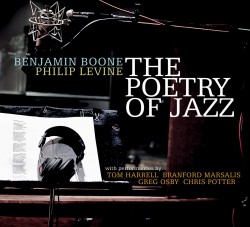MUSIC REVIEW BY Mark Corroto, All About Jazz
4-STARS Benjamin Boone's The Poetry Of Jazz could easily have been titled The Jazz of Poetry because of the almost interchangeable nature of the terms. The composer/saxophonist's vision to put music to the U.S. Poet Laureate Philip Levine's prose is a reminder to listeners that jazz was birthed by the common man, and is not to be kept in an ivory tower.
Both professors at Cal State Fresno, Levine and Boone had performed together before, and the saxophonist had used the poet's writing in some orchestral work. For this recording, made in multiple sessions over three years, Levine actually entered the studio to read his poems with a revolving cast of musicians, including guest artists Tom Harrell, Branford Marsalis, Chris Potter, and Greg Osby.
Levine's poetry, which won two National Book Awards and a Pulitzer Prize, has always centered on the working man, much like Kenneth Patchen's poetry or Bruce Springsteen's songs. For Patchen it was steel mills, for Levine automobile plants. The rhythms of assembly lines and the factory clock serve as a backdrop in poems like "What Work Is" and "A Dozen Dawn Songs, Plus One" causing the human spirit (like jazz) to rise above the grit and grease.
But like good jazz, poetry is also a history lesson. Here, Levine retells the Williamsburg Bridge legend of Sonny Rollins with Chris Potter's tenor saxophone accompaniment, and also of Charlie Parker's breakdown while recording "Lover Man," as told to the poet by trumpeter Howard McGhee. That history is also ingrained in our lives, with "I Remember Clifford," Tom Harrell plays the role of Clifford Brown as Levine recalls when he first heard "the high clear trumpet of Clifford Brown calling us all to the dance," and of the loss jazz endured at the trumpeter's sudden death at 25. Branford Marsalis plays the role of John Coltrane as Levine and his elderly mother both find solace in a Trane solo.
These guest artists might be the attraction for the jazz listener, and Levine for the poetry fan, but that would miss the extraordinary music both written and performed by Boone and several excellent sidemen, including pianist David Aus and bassist Spee Kosloff.
Both professors at Cal State Fresno, Levine and Boone had performed together before, and the saxophonist had used the poet's writing in some orchestral work. For this recording, made in multiple sessions over three years, Levine actually entered the studio to read his poems with a revolving cast of musicians, including guest artists Tom Harrell, Branford Marsalis, Chris Potter, and Greg Osby.
Levine's poetry, which won two National Book Awards and a Pulitzer Prize, has always centered on the working man, much like Kenneth Patchen's poetry or Bruce Springsteen's songs. For Patchen it was steel mills, for Levine automobile plants. The rhythms of assembly lines and the factory clock serve as a backdrop in poems like "What Work Is" and "A Dozen Dawn Songs, Plus One" causing the human spirit (like jazz) to rise above the grit and grease.
But like good jazz, poetry is also a history lesson. Here, Levine retells the Williamsburg Bridge legend of Sonny Rollins with Chris Potter's tenor saxophone accompaniment, and also of Charlie Parker's breakdown while recording "Lover Man," as told to the poet by trumpeter Howard McGhee. That history is also ingrained in our lives, with "I Remember Clifford," Tom Harrell plays the role of Clifford Brown as Levine recalls when he first heard "the high clear trumpet of Clifford Brown calling us all to the dance," and of the loss jazz endured at the trumpeter's sudden death at 25. Branford Marsalis plays the role of John Coltrane as Levine and his elderly mother both find solace in a Trane solo.
These guest artists might be the attraction for the jazz listener, and Levine for the poetry fan, but that would miss the extraordinary music both written and performed by Boone and several excellent sidemen, including pianist David Aus and bassist Spee Kosloff.
Soundclips
Other Reviews of
"The Poetry of Jazz":
JazzDaGama by Raul da Gama
All About Jazz by DUNCAN HEINING
The Jazz Duck by Editor
JazzTimes by Britt Robson
Step Tempest by Richard Kamins
The Normal School Literary Magazine by Optimism One
Downbeat by Michael Jackson
Jazz Weekly by George W. Harris
The Aquarian by Mike Greenblatt
Improvijazzation Nation by Rotcod Zzaj
New York City Jazz Record by John Pietaro
The Paris Review by Jeffery Gleaves
JazzTimes by Andrew Gilbert
NPR - All Things Considered by Tom Vitale
Fresno Bee by Joshua Tehee
